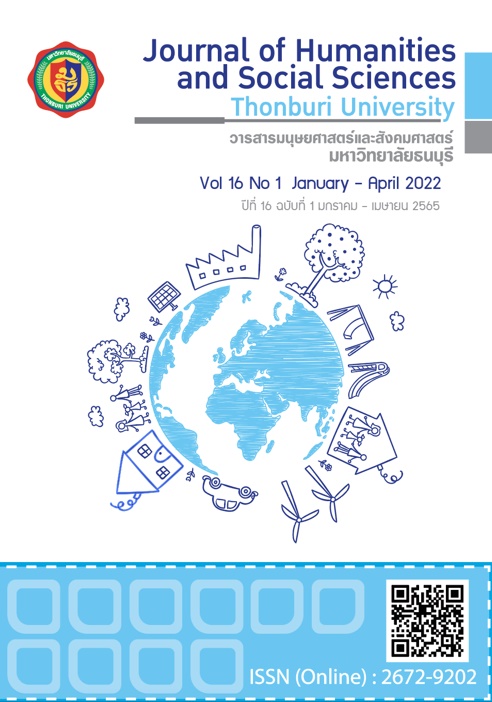การคาดการณ์ภาพจำลองสถานการณ์และปัจจัยที่ส่งผลต่อการฟื้นตัวของกลุ่มธุรกิจหลังสถานการณ์โควิด-19
Main Article Content
บทคัดย่อ
ปัจจุบันสถานการณ์โควิด-19 มีการแพร่ระบาดมากขึ้นในหลายระลอกที่ผ่านมา ซึ่งส่งผลต่อเศรษฐกิจในประเทศ จึงทำการศึกษาบทความวิชาการเรื่องการคาดการณ์และปัจจัยที่ส่งผลต่อการฟื้นตัวของกลุ่มธุรกิจหลังสถานการณ์โควิด-19 มีวัตถุประสงค์เพื่อศึกษาการคาดการณ์การฟื้นตัวและปัจจัยที่ส่งผลต่อการฟื้นตัวของกลุ่มธุรกิจหลังสถานการณ์โควิด-19 โดยการจำลองการคาดการณ์การฟื้นตัว 4 ภาพจำลองสถานการณ์ ผลการศึกษาพบว่า ภาพจำลองที่ 1 สถานการณ์กลับตัว ได้แก่ กลุ่มอุตสาหกรรม, กลุ่มการเงิน, กลุ่มเกษตร/อาหาร, กลุ่มทรัพยากร/พลังงาน และกลุ่มเทคโนโลยี จะฟื้นตัวได้ในทุกระยะ ภาพจำลองที่ 2 สถานการณ์ซบเซา ได้แก่ กลุ่มการเงิน และกลุ่มเกษตร/อาหารจะฟื้นตัวได้ในทุกระยะ ภาพจำลองที่ 3 สถานการณ์กลับมาได้บางส่วน ได้แก่ กลุ่มอุตสาหกรรม กลุ่มเกษตร/อาหาร และกลุ่มเทคโนโลยี จะฟื้นตัวได้ในทุกระยะ และภาพจำลองที่ 4 สถานการณ์เศรษฐกิจล่มสลาย ทุกกลุ่มธุรกิจ จะยังไม่มีการฟื้นตัวในทุกระยะ จากที่ได้ผลภาพจำลอง 4 สถานการณ์ นำมาสรุปแนวทางสำหรับปัจจัยที่ส่งผลต่อการฟื้นตัวประกอบด้วย 4 ปัจจัยหลัก ได้แก่ 1. ปรับประสิทธิภาพในการทำงาน 2. นำนวัตกรรมมาใช้ในการทำงาน 3. การดูแลพนักงานให้ปฏิบัติงานที่เหมาะสม และ 4. ประเมินศักยภาพและจัดหาพาร์ทเนอร์ชิพเข้ามาช่วยสนับสนุนเพื่อแก้ไขจุดอ่อน
Article Details
References
ARUP. Global Foresight, Arup. (2021). Business Recovery Scenarios. Retrieved May 10, 2021, from www.arup.com/perspectives/after-the-crisis-finding-business-clarity-and-opportunity.
Economic Research and Statistics Division. (2020). World Trade Organization. (WTO). Trade set to plunge as COVID-19 pandemic upends global economy, World Trade Organization. Retrieved May 10, 2021, from www.wto.org/english/news_e/pres20_e/pr855_e.htm#fntext-1.
Economic Research and Statistics Division. (2020). World Trade Organization. (WTO). Trade shows signs of rebound from COVID-19 recovery still uncertain. Retrieved May 10, 2021, from www.wto.org/english/news_e/pres20_e/pr862_e.htm.
Economist Intelligence Unit. (EIU). (2020). Sovereign debt crises are coming. Retrieved May 10, 2021, fromhttp://country.eiu.com/article.aspx?articleid=1499104133&Country=France&topic=Politics&subtopic=At+a+glance&oid=1669079150&flid=1099585293.
Herbert Smith Freehills (LLP). (2020). COVID-19 and foreign direct investment regulation - drawbridges continue to rise in response to the pandemic. Retrieved May 10, 2021, from www.lexology.com/library/detail.aspx?g=725393e0-08bf-4c39-8aad-b7932192e78a.
IMF (2020), Fiscal Monitor: Policies for the Recovery, [accessed: 11 May 2021]. https://www.imf.org/en/Publications/FM/Issues/2020/09/30/october-2020-fiscal-monitor.
Institute for Health Metrics and Evaluation. (2020). COVID-19 Projections. Retrieved May 10, 2021, from http://www.healthdata.org/covid/data-downloads.
Kees van der Heijden (2011). The Art of Strategic Conversation. 2nd Edition.
Organization for Economic Co-operation and Development. (OECD). (2020). Quarterly GDP (indicator). Retrieved May 10, 2021, from https://data.oecd.org/gdp/quarterly-gdp.htm.
Pakorn Peetathawatchai. Stock Exchange of Thailand. (SET). (2020). market value in 2020. Retrieved May 10, 2021, from https://www.bloomberg.com/profile/person/7097106.
The Stock Exchange of Thailand (SET). (2020). Data Business group in April 2020. Retrieved May 10, 2021, from www.set.or.th/set/holiday.do?language=en&country=US.
World economy. Economist Intelligence Unit. (EIU). (2020). Forecast summary. Retrieved May 10, 2021, from https://gfs.eiu.com/Article.aspx?articleType=gef&articleId=860156069&secId=0.
World Trade Association. (WTA). (2020). COVID-19: Trade and trade-related measures. Retrieved May 10, 2021,from www.wto.org/english/tratop_e/covid19_e/trade_related_goods_measure_e.htm.

